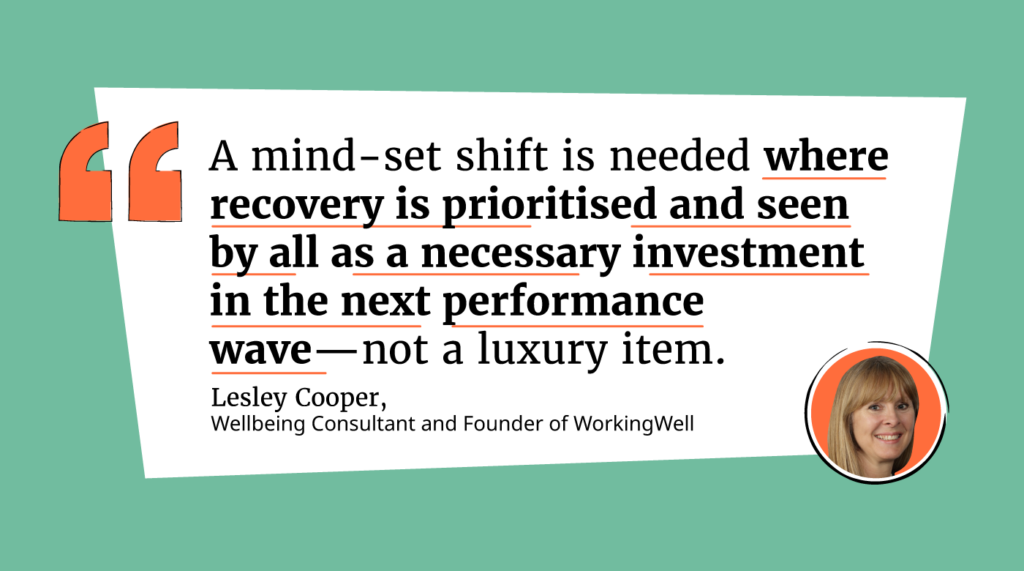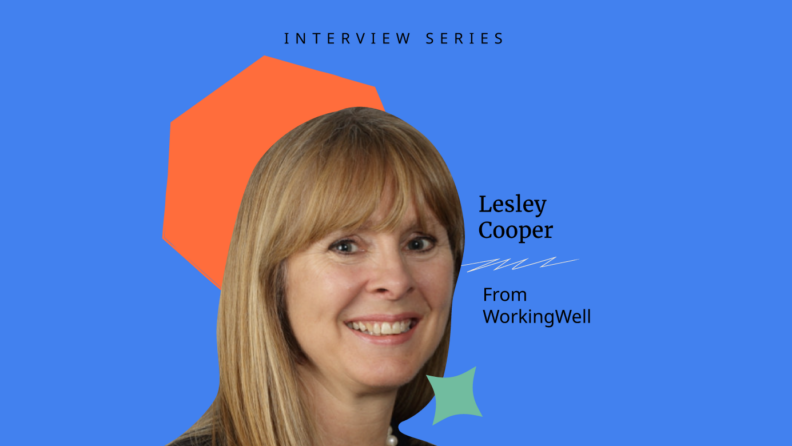We’re passionate about the world of work, and how we can make it better. To help satisfy our curiosity, we’ve launched an interview series where we pick the brains of experienced leaders, business owners, managers, and individual contributors to get their thoughts on how we can collectively build better workplaces.
We’d love to get to know you a bit better, tell us a bit about your backstory.
I have worked for 25 years in the design and delivery of all elements of employee wellbeing management programmes, paving the way to my current role as CEO of WorkingWell. I have committed most of my career to pioneering a more proactive approach to wellbeing in the workplace, consulting with many blue-chip employers at home and abroad, and developing enabling wellbeing measurement and management tools.
I started my career in the private healthcare sector and founded WorkingWell in 1997 after the birth of my second child. Our approach to wellbeing management has always rested on the need to understand the sources of poor wellbeing at work as well as encouraging employee resilience and offering support to those who may be negatively impacted by the demands of work and life. Our tools help leaders and managers quickly and easily assess the impact of pressure on an individual, a workgroup, a collection of teams or the organisation as a whole. Understanding sources as well as impacts enables us to assist companies in managing workplace pressure in a way that enhances growth and development, rather than energy and performance compromising stress. We were shortlisted for “Best Wellbeing Service Provider” at the Great British Workplace Wellbeing Awards 2021.
I am also the co-author with Dr Stephen Williams of “Dangerous Waters – Strategies for Improving Wellbeing at Work”, and “Managing Workplace Stress – a best practice blueprint.”
If we were to ask a friend to describe your personality to us, what would they say?
I am pretty certain they would say I am quite an open person, with strong views on the relationship between personal wellbeing and performance. I think they might also say that I was quite talkative and enthusiastic about life in general!
Thinking back to your career journey, what’s an interesting story that stands out?
The familiar golfing adage that ‘the harder you practice, the luckier you get’ feels true to me. Many of the key ‘breaks’ I had when first starting out, happened because I pushed myself to make the contact, be braver than I felt in the face of unfamiliarity or challenge or because I took work that I felt initially anxious to deliver on.
My first ever customer as a freelance consultant became my first ever customer precisely because I forced myself out to a networking event after a conference, even though I really didn’t want to go! Having delivered my paper I really wanted to go home, which I did, but I forced myself out again 4 hours later for the event. I was seated next to a stranger (of course—this is the point of networking!) who said that he had found my presentation ‘enlightening’, and on this basis was interested to see how we might be able to help his company. This chance meeting led to his company being one of our major customers for over 10 years but I could have given in to myself and stayed warm at home!
What’s the most impactful lesson you've learned over your career thus far?
That candour when consulting is not always as welcome as we may imagine! I am a big fan of psychologically safe workplace cultures—where employees feel free to be themselves and share their insights, without fear of negative consequences. I like to think that the WorkingWell team all operate on this basis, but even clients who are engaging you to help them improve in this area can struggle with unvarnished truth from consultants! The client always has the final say in relation to how the relationship goes, regardless of the depth of our experience, and so sometimes there is a need to soften up the message if we want to avoid winning battles but losing wars!
Thanks for giving us some insight into who you are! Let’s jump into things. When you hear the phrase “build a better world of work”, what comes to mind?
A community where leaders have cultivated a psychologically safe space where employees feel they can be open and honest without fear of judgement or consequence.
A better world of work requires all involved to work collaboratively, and leaders need to show up for their workers and make themselves available to actively listen to their employees' needs and show vulnerability when needed. This builds a constructive and creative environment where everybody feels included, nobody is isolated and most importantly there is an absence of performance depleting fear.
For you, what’s the main blocker you see as standing in the way of building a better world of work?
I think that so many organisations are blind to the direct correlation between employee wellbeing and sustainable performance.
When we employ someone, the whole person comes to work—not just the bit that does the job.
We therefore need to take a whole-person approach to wellbeing and recognise that to be fully effective at work, employees need to be able to function and have a full life outside of work. Using pressure on profitability as a reason to drive up workload (rather than resource appropriately) means that companies are often trading on goodwill and the employees' natural propensity to blur boundaries between home and work in order to keep delivering and avoid being seen as having failed or let the side down. Recovery is a necessity for sustainable high performance—it is not something that employees should reward themselves with when they are ‘caught-up’ or so exhausted they can’t carry on.

What’s one thing within our control that we can practically do to build a better world of work today? And, how do you recommend going about it?
A great way to encourage openness and vulnerability in the workforce is for leaders to model the behaviour themselves. Showing employees that you don’t always have the answers, that you also have fears and concerns and make mistakes can foster a culture where openness, trust and the sharing of experience and insight is possible.
When there is openness and trust, people are more inclined to experiment with new approaches which can speed up innovation and facilitate faster recovery from failure.
This also enables people to have more open conversations about mental health, burnout, bereavement, health problems, and other conversations that we often feel uncomfortable discussing.
Listening without judgement and demonstrating empathy are also key in helping a workforce feel seen and heard. This does not mean being a counsellor or having all the answers to everybody’s problems, but it does mean showing that you care and are there to offer support.
Can you share one thing you’ve experienced, seen, or read about that is leading us towards a better world of work?
There is growing awareness of the role that low psychological safety plays in poor workplace wellbeing and, critically, just how pivotal leadership behaviour can be in creating a ‘fearless organisation’. We ourselves are much influenced by the work of Harvard Professor Amy Edmondson in this area and it is gratifying to see how interest is growing in the topic in the UK. Amy’s work mentions many US companies who are getting this right and Pixar is a great example of both a psychologically safe workplace culture and the commercial success it facilitates.
How can our readers follow your work?
Website: https://www.workingwell.co.uk
Linkedin: lesley-cooper-5536302
Thank you for adding your voice to People Managing People’s interview series on How to Build a Better World of Work!
Thank you for having me!
Join our interview series and share your ideas for how we can build a better world of work!


